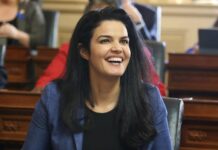
One Batten professor has found a way to rate Congressional representatives on their effectiveness at getting legislation passed, and his research is already making a big splash in the public policy arena.
Craig Volden is the Associate Dean for Academic Affairs at UVa’s Frank Batten School of Leadership and Public Policy. After years of conducting studies on American politics, Volden has landed at the helm of Batten’s new Center for Effective Lawmaking, a project that stems from the professor’s acclaimed research on how some politicians are able to successfully break through partisan gridlock to direct their legislation through Congress.
Volden says that he devised the idea for the project during a conversation with former colleague Alan Wiseman, then a fellow professor at Ohio State University.
“[We] were talking about the state of Congress generally, but also the literature on Congress,” Volden explains. “So much of the focus on Democrat vs. Republican, liberal vs. conservative – at least in our view – missed the fact that some members of Congress are a lot more effective than others at putting forward viable policy ideas, and helping navigate them through the system.”
It was at this point that Wiseman and Volden joined forces to figure out a way to measure who in Congress was actually getting things done.
“We were able to find the data, and track down every bill sponsored in the House of Representatives from 1973 to the present, who the sponsors were, how far each bill moved through the lawmaking process, and we were able to code off how important those bills were,” Volden says.
The result was a single “legislative effectiveness score” for every member of each House of Representatives and each Senate from 1973 to the present, visible in this interactive map. Volden and Wiseman then used the data to explore further research questions: what backgrounds of Congressional representatives are correlated with potential effectiveness, and is Congress even structured in a way that will let effective members get things done? In addition, what do voters know about how effective their lawmakers are, and will they hold them accountable?
Popular interest in this research began to grow, especially when Volden and Wiseman published Legislative Effectiveness in the United States Congress: The Lawmakers in 2015. Their work won both the 2015 Fenno Prize and the Gladys M. Kammerer Award for the best book published on U.S. national policy that year.
Integral to the book’s findings were the researchers’ development of the five habits of an effective lawmaker:
(1) “develop a legislative agenda rooted in personal background, previous experiences, and policy expertise”
(2) “develop a legislative agenda tightly focused on district needs”
(3) “be entrepreneurial with positions of institutional power”
(4) “be open to compromise, even with those who are not natural allies” and
(5) “cultivate a broad set of allies, even beyond the House.”
It was not just the book’s list of effective lawmaking skills that attracted attention. One conclusion that women are more effective lawmakers than men sparked widespread discussion, as did the discovery that bipartisan politicians accomplish more in Congress.
Media coverage on Volden and Wiseman’s research has spanned from articles in The New York Times and The Washington Post to interviews with CNN and NPR. Volden knows that the potential impact of his work stretches farther than what even he and Wiseman expected when their project began.
“I, along with others, have this view that what we’re doing now goes beyond a small research project to something that we’d love for students to be involved with in a center that speaks to a broader policymaking community,” he says.
The new center, which will be introduced at a September 26 conference in Washington, D.C., seeks to involve both undergraduate and graduate students at the University, with the goal of conducting further research on legislative effectiveness.
Volden hopes that the center will be utilized not just by students, but by lawmakers seeking to learn what they can do to pass effective legislation more frequently. The launch event will feature speakers including U.S. Rep. Elizabeth Esty (D-CT), U.S. Rep. Lamar Smith (R-TX), U.S. Rep. Steve Cohen (D-TN), and Bill Richardson, the former Governor of New Mexico. While these politicians are experienced, Volden says that he has already spoken to this year’s newest members of Congress about his findings.
“We’d love to be in a position to give them concrete advice about hitting the ground running,” Volden explains. “Some of our findings thus far are around the habits of highly effective lawmakers, and those habits are ones that people can start to establish even early on.”
Volden’s ambitions for the center don’t end there. “Giving them those levels of insight was a helpful first step, and as our research becomes more robust, we’ll be able to offer more advice at that level – and maybe expand it in the future to state legislatures, and even to other legislatures around the world.”
Students interested in joining the center as interns or research assistants can contact Greer Kelly at egk4r@virginia.edu or can call 434-924-7064 for more information.
















